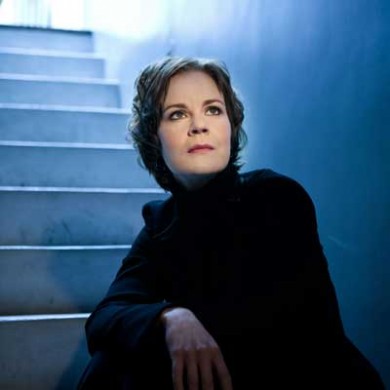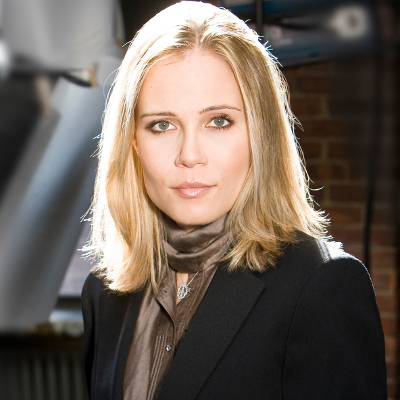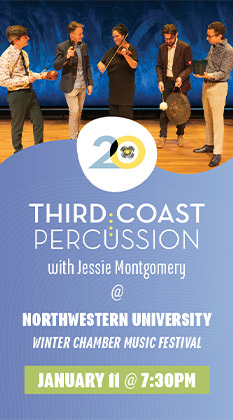Mälkki shows her mastery in return to CSO
With recent disparaging comments in the news from some noted Russian conductors about how their female podium colleagues don’t have the right stuff, all one has to do to refute such clueless sexism is point to Susanna Mälkki.
The Finnish conductor made a sensational debut with the Chicago Symphony Orchestra two years ago, pulling off a difficult and demanding program with uncommon interpretive insight, immaculate balancing and huge panache.
Mälkki is back this week for a welcome return engagement. The repertoire is less flashy and the spotlight was stolen to some extent by soloist Leila Josefowicz at Thursday’s shortened Afterwork Masterworks program. But Mälkki proved once again that she is the real thing.
The conductor is a kinetic, fascinating presence on the podium, eschewing a baton and directing with elaborate yet precise gestures.
Mälkki’s take on La Mer was characteristic of her ability to provide fresh illumination in even the most familiar music. She followed Pierre Boulez at Ensemble Intercontemporain and her lucid textures and acute balancing show some of the influence of her senior French colleague.
Yet Mälkki’s touch in Debussy’s tripartite tone poem is warmer and more elastic, without Boulez’s intellectual chill, which can make these waters seem north of Iceland. The music proceeded with a natural ease, Mälkki often very free in pacing the ebb and flow but with an organic, undulating momentum. The dynamic range was vast but, likewise, never felt forced or mannered.
Throughout this performance, La Mer took on an expressive depth rarely encountered with the brilliant finale having surging excitement as well as a weighty eloquence. The CSO members clearly respond to this gifted musician and played superbly with especially noteworthy solo work from principal flutist Mathieu Dufour.
Mälkki is a committed advocate for contemporary music, represented on this program by Thomas Adès’ …but all shall be well.
Written in 1993 at age 21, Adès’ first work for orchestra displays the British composer’s creative precocity. The title, taken from the last of T.S. Eliot’s Four Quartets, is fitting for Adès’ style of music in which the center often cannot hold.
The ten-minute work feels larger than its duration suggests, and shows startling confidence and brash individuality. There are fleeting backwards echoes of English Romanticism, as if glimpsed through a broken window, yet Ades’ rugged mature style was clearly already nearly formed. Winding and unsettled, the work moves with its restless tonality and roiling energy toward a surprisingly satisfying and inevitable-seeming coda.
Mälkki again elicited playing of a strikingly wide dynamic range in a fluent and powerful performance. Adès, who led the Boston Symphony Orchestra last week, was in the house and shared a bow with Mälkki and the orchestra.
One can hardly think of a better pairing of soloist and music than Leila Josefowicz in Stravinsky’s Violin Concerto.
Josefowicz is very much the anti-romantic fiddle virtuoso. She doesn’t command a plush, gleaming tone yet her arsenal of no-holds-barred bravura is complete.
Until the final movement, Stravinsky’s jokey 1931 work seems more like a satire on violin concertos than the actual thing. Josefowicz’s off-center musical style suits this music, the violinist’s lean, somewhat wiry timbre apt for Stravinsky’s astringent wind-dominated acerbities.
The soloist handled the galumphing good humor as surely as the skittering burlesque. Josefowicz’s playing lent an apt edge to the lyrical theme of the second Aria and she blazed through the closing Cappriccio at a fearless tempo with Mälkki and the orchestra with her every step of the way.
The conductor proved a congenial partner for Josefowicz, refusing to inflate the score’s Neo-Classical dimensions and bringing out the concerto grosso-like qualities with characterful solo contributions by CSO members.
The program will be repeated 8 p.m. Saturday and 7:30 p.m. Tuesday, with the addition of the Suite No. 1 from Sibelius’s The Tempest. cso.org; 312-294-3000.
Posted in Performances





Posted Oct 20, 2013 at 11:27 am by Edward
Another don’t miss performance by the CSO. I was most impressed by Sibelius’ The Tempest Suite no 1 though.
Posted Oct 23, 2013 at 5:34 pm by Tod Verklärung
One can only hope that the CSO is working on some permanent association with this conductor. Mälkki’s apparently wide repertoire, her commitment to new music, and her ability to find something new even in pieces like “La Mer,” all suggest that she might be an appropriate “Principal Guest Conductor” now, and perhaps Music Director some day.